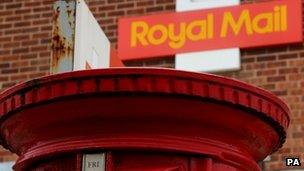Royal Mail 'underpriced, two investment banks warned'
- Published

Two banks warned Royal Mail was underpriced ahead of sale
The government ignored two banks that valued Royal Mail at £5bn, far more than shares were sold for, the Financial Times, external has reported.
The government sold 60% of the postal service last week for £3.30 per share, but they soon passed £5.
The FT said at least two banks had said shares would be worth up to £5 each.
The government said banks' estimates had been made long before fresh factors arose, such as strike threats and financial uncertainty in the US.
Strike threat
The government sought opinion from investment banks bidding to manage the sale, and selected Lazard as its independent adviser, before deciding to dispose of 60% of Royal Mail at an Initial Public Offering (IPO) price of £3.3bn.
Goldman Sachs, Barclays, Bank of America Merill Lynch and UBS were appointed to lead the sale.
Lazard has now been called in by the Commons Business, Innovation and Skills (BIS) select committee to answer questions on the pricing after shares had hit 508.3p, before closing at 502.5p.
In a statement, a Department for Business, Innovation and Skills spokesman said seven of the 21 banks that pitched in May to act for the government on the sale of Royal Mail were successful.
"The proposals included indicative valuations of the company based, in many instances, solely on information already in the public domain," he said.
"Banks made their own assumptions of Royal Mail future performance.
"The range was wide with the median around £3.6 billion taking into account IPO [initial public offering] discount. The banks appointment process was overseen by Lazard as independent advisers to government.
He added: "The banks' proposals came months before any threat of strike action by the unions, financial market uncertainty in the United States and other factors which the government has already said were taken into consideration in setting a price for the company in September."
Initial Spike
Business select committee member Nadhim Zahawi said he believed the government had got its sums right.
Conservative MP Mr Zahawi said he thought the government had acted wisely, given the risks of a flotation.
He told the BBC News Channel: "The right thing to do is to bring in as many banks as possible. Ones that work closely with the Royal Mail, ones that advise the government.
"When you are trying to get a placing that large away, what you don't want is egg on your face if it doesn't get the investment community excited."
He added: "It feels to me that this story is a bit of sour grapes from a couple of banks who weren't very close to the business.
"The problem to remember as well is that the government still has a substantial shareholding that at some stage it will want to sell down."
Mr Zahawi warned of the danger that could be posed should the government face the prospect of selling its remaining stake at below the launch price and that it would be "far more negative than a successful IPO with shares going up".
It was common practice to see government sell-offs priced at around 20% below full value so early investors are not penalised.
He said: "Let's look at the share price in six months' time when the froth has gone away when you take out the initial spike and where the shares settle. When you look at comparators ie on dividend on yield on profitability, I think the price was just about right."
- Published18 October 2013
- Published15 October 2013
- Published19 October 2013